Related Research Articles
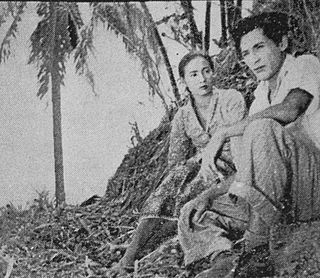
Embun is a 1952 film directed by D. Djajakusuma for Perfini in his directorial debut.

Misbach Yusa Biran was an Indonesian writer, director and columnist who pioneered the Indonesian film archives.

The Teng Chun, also known by his Indonesian name Tahjar Ederis, was an Indonesian film producer. Born to a rich businessman, The became interested in film while still a youth. After a period as an exporter, in 1930 he established Cino Motion Picture to produce films in the Dutch East Indies. In a little over a decade he and his company had released at least 31 films, including some of the country's first talkies. Although he experienced a brief resurgence during the 1950s, after Indonesia became independent, he spent the last years of his life as an English teacher.

Djadoeg Djajakusuma was an Indonesian film director and promoter of traditional art forms. Born to a nobleman and his wife in Temanggung, Central Java, Djajakusuma became interested in the arts at a young age, choosing to pursue a career in theatre. During the Japanese occupation from 1943 to 1945 he was a translator and actor, and in the four-year national revolution which followed he worked for the military's educational division, several news agencies, and in drama.

Tjambuk Api is a 1958 Indonesian martial arts film directed by D. Djajakusuma and produced by Usmar Ismail. Starring Bambang Irawan, Aminah Cendrakasih, Soekarno M. Noer, and Rendra Karno, it tells of a young villager who must challenge a local criminal to be with his love. The film underwent several modifications over a period of more than a year before it could pass the censorship board, but now remains one of Djajakusuma's better known works.

Gadis Desa is a 1949 comedy from what is now Indonesia written and directed by Andjar Asmara. Starring Basuki Djaelani, Ratna Ruthinah, Ali Joego, and Djauhari Effendi, it follows the romantic hijinks of a village girl who is taken to be a rich man's second wife. The film, produced by a Dutch-run company, is recognised as the first in which future "father of Indonesian film" Usmar Ismail was involved.

Darah dan Doa is a 1950 Indonesian war film directed and produced by Usmar Ismail, telling the story of the Siliwangi Division and its leader Captain Sudarto on a march to West Java. Following Ismail's Dutch-produced Tjitra (1949), Darah dan Doa is often cited as the first 'Indonesian' film, and the film's first day of shooting – 30 March – is celebrated in Indonesia as National Film Day.

Astaman also known as Tirtosari, was an Indonesian actor active from the 1910s until the mid-1970s. He was a leading actor in the influential theatre company Dardanella and, after entering the film industry with 1940s Kartinah, acted in 43 films.

Air Mata Iboe is a 1941 drama film from the Dutch East Indies directed and written by Njoo Cheong Seng. Starring Fifi Young, Rd Ismail, Ali Sarosa, and Ali Joego, it followed a mother who raises her children lovingly but is ultimately betrayed by her eldest sons when she falls upon hard times. The film, billed as a "musical extravaganza," featured a soundtrack by R. Koesbini, and an eponymous title song written by Njoo.

Bajar dengan Djiwa is a believed lost 1941 film from the Dutch East Indies. Directed by R Hu and produced by Ang Hock Liem, it starred A Bakar, Djoewariah, O Parma, Oedjang, RS Fatimah, Soelastri, and Zonder. The story centers on two families torn apart by finances and clashes of personality.

Mas Sardi was an Indonesian composer and musician notable for being the country's first professional music supervisor. He and his wife Hadidjah were the parents of Citra Award-winning musician Idris Sardi.
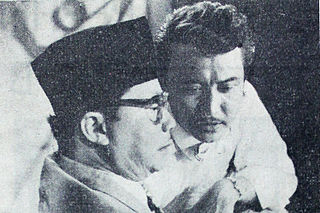
Tamu Agung is a 1955 Indonesian dramatic comedy film directed by Usmar Ismail. It stars Cassin Abbas, Nina Amora, M. Pandji Anom, and Chitra Dewi. The satirical political comedy, about the anticipation of the visit of a dignitary to a small isolated village in East Java, was critically acclaimed, although it was disliked by the government. The film, produced under the Perfini banner, was shot by cinematographer Max Tera. This movie is set in the modern day.

Rara Patma Dewi Tjitrohadiseikusumo, best known under her stage name Chitra Dewi, was an Indonesian actress and director. She was noted for her roles in Usmar Ismail's films of the 1950s, appearing in films such as Tamu Agung, Tiga Dara, and Pedjuang, although she remained active in cinema until 1993 and won a Citra Award for Best Supporting Actress at the 1979 Indonesian Film Festival for Gara-gara Isteri Muda. Dewi also had a brief stint film directing in 1971, making her one of only six Indonesian women to direct a film before 1998.
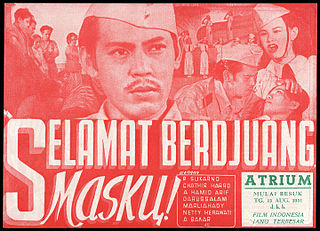
Selamat Berdjuang, Masku! is a 1951 Indonesian film directed by R.H. Andjar Subyanto and starring Raden Sukarno and Marlia Hardi. It follows a former guerrilla leader who must pursue his love despite the interference of his former comrades.
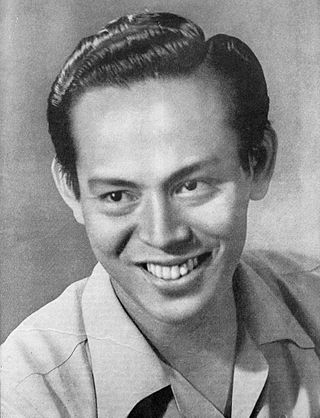
Raden Soekarno, better known as Rendra Karno, was an Indonesian actor. Born in Kutoarjo, Central Java, Soekarno entered the film industry in 1941, making his debut appearance in Union Films' Soeara Berbisa. Over the next forty years he appeared in more than fifty films. He was also involved in the theatre during the Japanese occupation of the Dutch East Indies and the Indonesian National Revolution. For his role in 1962's Bajangan di Waktu Fadjar, he was named best supporting actor at the 1963 Asian Film Festival in Tokyo.
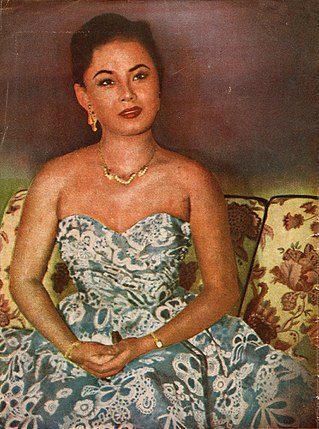
Netty Herawaty was an Indonesian actress who made more than fifty films between 1949 and 1986.

Tiga Dara is a 1957 Indonesian musical drama film starring Chitra Dewi, Mieke Wijaya, and Indriati Iskak. Directed by Usmar Ismail for Perfini, the film follows three sisters who live with their father and grandmother. When the eldest sister, Nunung, shows no interest in marrying, her family tries unsuccessfully to find a husband for her. Nunung initially rejects the advances of a young man named Toto, who instead dates her younger sister. However, when he becomes jealous and travels from Jakarta to Bandung to profess his love, she agrees to marry him.

Indriati Gerald Bernardina, also known by her stage name Indriati Iskak and after marriage as Indri Makki, is an Indonesian actress turned psychologist and marketer. She entered the Indonesian film industry and soared to popularity with Usmar Ismail's commercially successful Tiga Dara (1957). She appeared in eight further films and established her own girl group before retiring from cinema in 1963. She graduated from the University of Indonesia with a degree in psychology in 1968, and has taught the subject at the Jakarta Art Institute. For twenty-six years she worked with Unilever, and since 1994 she has been a marketing consultant with Makki Makki.

Farouk Achmad, often credited as Farouk Afero, was a British India-born Indonesian film actor. After making his feature film debut in 1964, he rose to fame in 1970 with Bernafas dalam Lumpur. Afero ultimately appeared in more than sixty films.

Delma Juzar, also known as Del Yuzar, was an Indonesian actor and soldier turned lawyer. Juzar made his film debut in Darah dan Doa (1950) and starred in several films before going to the Faculty of Law at Universitas Indonesia in 1951.